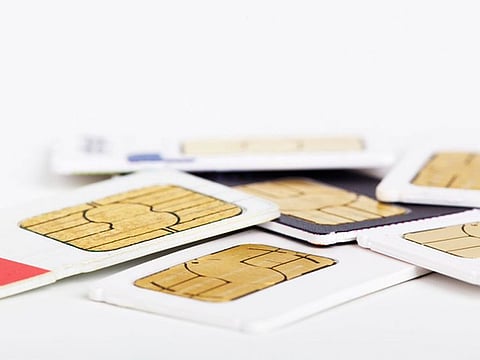Philippines: Register your phone SIM card — or face deactivation
Mandatory online registration starts from December 27, 2022

Manila: A new law requiring SIM card registration of all phone users — including children, foreigners and pre-paid account holders — is expected to curb mobile phone fraud that's rampant in the country.
Following the ratification of a new law requiring SIM card registration, old and new phone customers in the Philippines will be required to register their SIM cards.
Deactivation for failure to register
Existing subscribers have six months under the new rule to register their SIM card — or face deactivation.
Violators of the law could also face fines or jail. The National Telecommunications Commission (NTC), the industry regulator, has announced that all SIMs should be registered.
Under the law, all public telecommunications entities (PTEs) must register SIM cards as a prerequisite to their sale and activation. The registration platform of telcos will be open on December 27, 2022, the NTC stated.
Republic Act No. 11934
Section 4 of R.A. No. 11934 provides for a system mandating SIM card registration as a prerequisite for activation. SIM cards sold by Public Telecommunications Entities ("PTEs") or resellers must be disabled. All existing SIM subscribers must register their SIMs with their respective PTEs within one hundred eighty (180) days of the law's effective date, which may be extended for a period not exceeding one hundred twenty (120) days by the Department of Information and Communications Technology ("DICT"). Failure to register the current SIM results in its deactivation, which can only be reactivated following registration.
Penalties
The law imposes fines on telecom service providers, their authorised SIM card sellers, and government workers who fail to comply.
On September 28, 2022, the Philippine House of Representatives approved the bicameral conference committee reports on the proposed legislation requiring the registration of SIM cards; the Senate approved the bill a day earlier (September 27). President Ferdinand Marcos Jr. signed it into law on October 10.
Before the passage of the law, SIM cards were not required to be registered in the Philippines — a fact exploited by many to use them for fraud.
Marcos Jr.' predecessor, Rodrigo Duterte, vetoed the legislation because of a now-deleted provision requiring social media users to register their identities and phone numbers.
The country's leading telecom provider PLDT said preparations are underway to comply with the new registration requirements, while Globe Telecom and DITO Telecommunity called for a wider rollout of the national identification system to help verify users.
Thousands of Filipinos have lost money to phising via short messaging services this year, but only a few have filed formal complaints, the information and communications ministry said.
How to register your SIM
Individuals:
Juridical entities:
Minors
Foreign tourists:
Who can access user information:
The law has confidentiality and non-disclosure of information provisions.
Information of any subscriber can only be provided upon sobpoena or lawful order from the court, or upon a written request from a law-enforcement agency investigating a possible involvement of a mobile number in a malicious or unlawful act.
If phone is lost/stolen:
Report to your respective telecom provider if there are any changes in the information provided, and if the same is lost or stolen.


